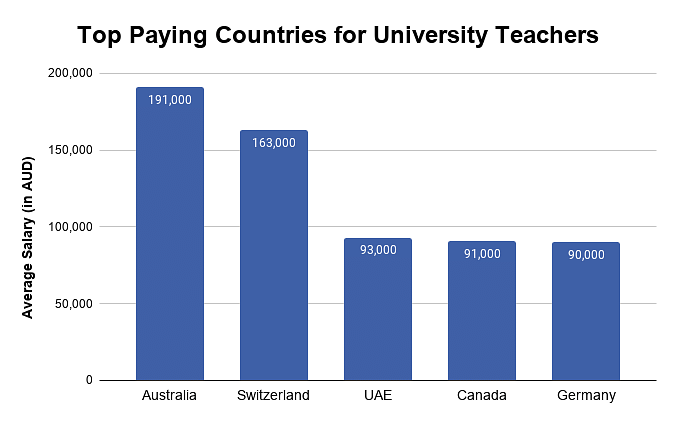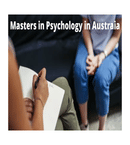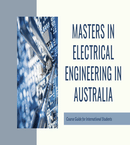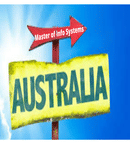Master of Education (M.Ed) in Australia is a 1-2 year degree providing relevant professional learning for educators in various fields such as early childhood, primary, secondary, tertiary, vocational, and adult. The Labor Department of the country says that post-secondary teaching positions will increase by some 15% by 2022, which is greater than most other occupations.
- Master of Education is designed for professionals who want to develop or extend their expertise, and seek to move into leadership, specialist, and/or coordinator positions.
- The average tuition fee of universities offering masters in education in Australia is between 21,630 AUD to 37,300 AUD.
- Students with a Master of Education in Australia can earn approximately 88,000 AUD per annum.
- Other potential career paths, such as principal, offer even higher median salaries to professionals who possess a master's degree from universities of Australia.
Why Study Master of Education in Australia?
Master of Education degree attracts a lot of international students for studying in Australia due to the fast growth of the education and training industry. Following are some of the facts contributing to the popularity of this degree:
- According to the Department of Employment, Skills, Small and Family Business of Australia, over 1,035,400 people were employed in the education and training industry which is 31% of the total employment of the country.
- The industry is projected to grow by 11.2% by May 2023.
- 72% of the population employed in the education and training industry is female.
- Only 39% of the people employed in this industry are working part-time.
- Top employing occupations in this sector are primary school teachers, secondary school teachers and educational aides.
- University Teacher in Australia is the highest paid profession across all countries of the world.

Top Universities offering Master of Education in Australia
Following are the top universities offering masters of education in Australia, according to QS News Ranking of 2020
| QS Ranking 2022 | University | Program Offered | Duration | Annual Tuition Fees (in INR) |
|---|---|---|---|---|
| 38 | University of Sydney | Master of Education (TESOL) | 1 year | 25.72 lakhs |
| 133 | University of Technology Sydney | Master of Education | 2 years | 14.92 lakhs |
| 193 | University of Wollongong | Master of Education- Higher Education | 2 years | 12.44 lakhs |
| 213 | Queensland University of Technology | Master of Education | 1.5 years | 22.82 lakhs |
| 362 | La Trobe University | Master of Education (TESOL) | 2 years | 19.07 lakhs |
| 407 | Flinders University | Master of Education | 2 years | 19.46 lakhs |
| 436 | University of Canberra | Master of Education | 1 year | 15.06 lakhs |
| 701 | University of Southern Queensland | Master of Education- Special Education | 1.5 years | 12.26 lakhs |
| 801 | Australian Catholic University | Master of Teaching | 1.5-2 Year | 13.47 lakhs |
Masters of Arts in Teaching v/s Masters Of Education
The basic difference between MAT and ME degree is the learning objective and career aspirations of the students enrolling for it. Those working towards a MAT degree try to advance their career in teaching and lesson instruction. On the other hand, students from ME program try to focus on the fields of administration and curriculum design.
| Degree Components | MAT | ME |
|---|---|---|
| Average Units/Credits | 42 | 36 |
| Time to Complete | 2 years | 2 years |
| Program Focus | Practical skills and subject-specific information | Understanding and critically evaluating the practice of education |
| Teaching Experience? | No | Yes |
| Example Coursework | History and Philosophy of Education, Learner Differences | Educational Leadership, Curriculum Design and Development |
| Common Careers | High School Teacher; Special Education Teacher; Middle School Teacher; Elementary School Teacher |
Adult Literacy Teacher; Principal; Instructional Coordinator; Reading Specialist |
Course Curriculum for Master of Education
The course encompasses a number of topics under its curriculum:
- Gender and Education
- Contentions in Inclusive Education
- Autism Spectrum and Engagement
- Science and Technology in Contemporary Society
- Using Multimedia for Learning
- Methods for Individualized Learning
- Critical Perspectives in Curriculum Leadership
- Big Ideas in Curriculum, Policies and Pedagogies
- Big Ideas in Social Justice: Theory to Practice
- Based Project
- Learning and the nature of communication
Admission Process of Master of Education in Australia
A bachelor's degree in a relevant field is required to apply for masters of education in Australia. Inquiries regarding the application must be sent at least 12-15 months before the proposed date of admission.
Where to Apply
- Via email: Request application forms from the university website. Universities usually have a form on their website through which applications can be requested.
- Downloading from the university website: Most university's websites provide downloadable and ready-to-print versions of their application forms.
- Getting applications from University Representatives: Application forms can be obtained from various authorized representatives of Australian Universities in India.
Academic Requirements for Masters of Education in Australia
- 3-year bachelor’s degree equivalent to an Australian university’s bachelors degree
- 16 years of formal education including a bachelor’s degree
- Hold a GPA of 3.0
- Passing the GRE general test
- Successfully pass an admission interview
- Good English language skills or IELTS which is also the only English proficiency exam accepted by the Australian Department of Immigration and Citizenship.
Documents Required for Master of Education in Australia Admission
- Details of the course subjects and grades of college or university
- Official transcript of college or university
- A statement of purpose
- A letter of recommendation
- Attested copies of the following:
- Standard X Mark sheet
- Standard XII Mark sheet
- Bachelor Degree / Provisional Certificate with mark sheet
Also Check:
The Australian Government allows people who are not Australian citizens or permanent residents to study in Australia. In order to apply for an Australian student visa, one must:
- Have an unconditional offer of a place at a university
- Have accepted that place in writing
- Have paid the required tuition fee deposit
- The program one chooses must be between 12 and 52 weeks in order to be eligible for a student visa.
For all programs of study, one will need to apply for a subclass 500 student visa. New Zealand nationals wishing to study in Australia should apply for the Special Category visa.
Cost of Studying Master of Education in Australia
Australia’s standard of living is considered the highest in the world. Living expenses and tuition costs are considerably lower here than in the United States and United Kingdom. International students are able to work part time while they study. There is also the possibility of scholarships, which helps to lower the cost of living in Australia for international students.
Cost of studying abroad can be divided into three categories: Pre-arrival Cost, Tuition Fees and Cost of Living. These are further discussed in brief below.
Pre-arrival Cost
Pre-arrival cost includes the expenses that are incurred before arriving at the campus. This may include the application fees, English language exam registration fees, Australian student visa application fees, application acceptance deposit, etc.
| Type of Expense | Cost (in INR) |
|---|---|
| Application Fees | 5,700 – 8,500 |
| IELTS Registration Fee | 18,500 – 20,690 |
| TOEFL Registration Fee | 15,518 |
| Visa Application Fees | 32,330 |
Tuition Fee of Master of Education in Australia
International students in Australia are required to pay their tuition fees up-front. Some institutions also charge for other student costs, in addition to tuition fees. These include the library, laboratory, or sports facility costs.
Students should also consider the costs of excursions, books, and stationery, as well as any essential materials specific to their course of studies, such as lab coats or photographic supplies.

Cost of Living in Australia
Under the Migration Regulations, prospective student’s visa applicants and their family members must have access to the following funds in order to meet the living costs requirements:
- A$18,610 a year for the main student;
- A$6,515 a year for the student’s partner;
- A$3,720 a year for the student’s first child; and
- A$2,790 a year for every other child and where required.
Accommodation for International Students in Australia
One of the first things that international students will have to determine when preparing to study in Australia is where to live. The majority of Australian students live off-campus through homestay programs, in hostels, or rental properties. However, some universities provide housing options, which allows you to socialize with local students.
Following are the types of student accommodation available in Australia:
- Homestays: Homestay programs involve an international student living with an Australian family in their home. Single or shared rooms are generally available, and costs vary by type of room but are usually between A$110 and A$270 per week. Although meals are generally covered under the cost, self-catered homestay is also available.
- Hostel and Guesthouse Accommodation: Some international students choose to stay in hostels or guesthouse accommodations. Kitchen and bathroom facilities are shared, and students cook for themselves in this type of accommodation. At around A$80-A$135 a week, these accommodations tend to be cheaper than university or homestay accommodations.
- Rental Property: Many students in Australia choose to share the cost of a rental property with several housemates. Rental accommodations generally cost around A$100-A$400 per week, and shared rental accommodations cost around A$70-A$250 per week. These accommodations usually require payment of rent in advance, as well as a secure payment, which is generally equal to one month’s rent, paid upfront.
- On-Campus Housing: Prices and availability of accommodations vary according to the university. Generally, on-campus accommodation costs around A$80-A$250 per week.
Scholarships for Master of Education in Australia
Although most international students in Australia are full-fee paying students, they may also choose to apply for a scholarship to ease the financial burden. Australian Government scholarships are not available for international students who are undertaking English language training specifically in Australia, but several institutions offer English language training scholarships.
Some of the scholarships for international students in Australia are:
| Scholarship | Facilities Provided |
|---|---|
| Australia Award Scholarship | A full tuition fee waiver; Travel expenses; Initial grant of 5,000 AUD; Maintenance stipend (approximately 30,000 AUD per year); Overseas Student Health Cover (OSHC); Student Services and Amenities Fee (SSAF); Visa fees; Other sundry expenses |
| Destination Australia Scholarship | 15,000 AUD per year for the duration of your course. |
| Research Training Program (RTP) Scholarship | Approximately 30,000 AUD per year |
| Australian-American Fulbright Commission Scholarship | A monthly stipend for up to 10 months; Travel expenses; Healthcare insurance; Networking opportunities through Fulbright Alumni |
Work While You Study
International students in Australia can get permission to work part-time (up to 40 hours per fortnight) while they study. Student visas in Australia automatically give permission to work. Visa information is held by the Australian Department of Immigration (DIAC) and can be accessed at any time using the Visa Entitlement Verification Online (VEVO) system.
International students in Australia very often find work in retail, hospitality, and administration. They are covered by Australian workplace law and practice. Any international student who intends to work here should first obtain a Tax File Number (TFN) from the Australian Tax Office.
Scope after Master of Education in Australia
With a Master of Education degree, you can apply directly to an administrative position. This would allow you to have an impact on more number of students. The average salary of students completing masters of education in Australia is 88,000 AUD.
Some jobs in Australia which a Master of Education graduate can take up are:
| Job Role | Average Annual Salary (in INR) |
|---|---|
| Primary School Teacher | 38.84 lakhs |
| Secondary School Teacher | 38.81 lakhs |
| High School Teacher | 37.68 lakhs |
| Instructional Designer | 45.56 lakhs |
| Training & Development Manager | 57.37 lakhs |
| Business Development Manager | 51.18 lakhs |
| Chief Executive Officer | 75.36 lakhs |
Coursework for a Master’s program includes things like theories of education, teaching strategies, forms of assessment, and student learning and behaviour patterns. Hence there is a brief exposure to those topics during teachers’ undergrad years, but going through a Master’s program will encourage the students to apply them to the classroom specifically.
Advanced degrees lead to higher incomes. Some school districts even offer automatic wage increases for teachers with a master’s in education. This course is designed for teachers, principals, community educators, youth workers, policy-makers or any professional whose work has an educational component or responsibility.
FAQs
Ques. Is it worth it to get a Master of Education in Australia?
Ans. The reports of the National Center of Education Statistics shows the declining rate of students completing their master’s in education which sets a potential opportunity for those already working in the field by obtaining a master’s degree. Also, the growth rate of jobs in Australia in teaching sector is projected to be 11.2% by May 2023.
Ques. Name some of the top universities offering Masters in Education in Australia.
Ans. University of Sydney, University of Technology Sydney, University of Wollongong and Queensland University of Technology are some of the top universities offering Master of Education in Australia.
Ques. Are there any entrance exams to get into a Masters in Education in Australia?
Ans. Students are asked to submit their GRE scores before applying for the master’s programs. Some universities even hold interviews to assess the nature of an applicant’s abilities.
Ques. How long does it take to get a degree in Master of Education in Australia?
Ans. Typically, a Master of Education in Australia takes around 2 years to complete as a full-time student and around 3-4 years for a part-time student.
![Australian National university test1 [Anu Canberra]](https://static.zollege.in/public/college_data/images/studyabroad/logos/college_597_12-11:31_anu_logo_fb_350.png?tr=w-50,h-50,c-force?tr=h-40,w-35,c-force)
![The University of Melbourne [Unimelb]](https://static.zollege.in/public/college_data/images/studyabroad/logos/college_609_20-15:00_mel-Logo.jpeg?tr=w-50,h-50,c-force?tr=h-40,w-35,c-force)
![University of New South Wales [Unsw Sydney]](https://static.zollege.in/public/college_data/images/studyabroad/logos/college_603_29-10:36_logo.jpeg?tr=w-50,h-50,c-force?tr=h-40,w-35,c-force)
![The University of Sydney [Usyd]](https://static.zollege.in/public/college_data/images/studyabroad/logos/college_620_29-11:04_logo.jpeg?tr=w-50,h-50,c-force?tr=h-40,w-35,c-force)
![The University of Queensland [UQ]](https://static.zollege.in/public/college_data/images/studyabroad/logos/college_596_29-11:20_queensland_Logo.jpeg?tr=w-50,h-50,c-force?tr=h-40,w-35,c-force)













